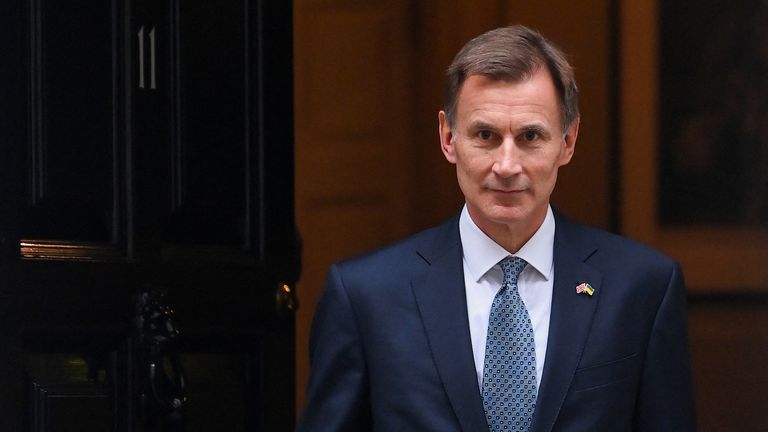After the debacle of Liz Truss’s September mini-budget, with all its mega ramifications, and an autumn statement eight weeks later that performed an about-turn so big that the country’s tax burden hit a 70-year-high, Wednesday’s budget will be all about stability and sticking to the plan.
“No big bangs in this budget,” is how one senior government insider put it to me last week. “It’s got to be a growth budget.
“We’re fighting to be competitive again with Labour. If we can get to next summer and the economy is ticking up, and we can narrow the gap to five to eight points behind in the polls, there’s a chance in an election campaign we can shift the dial.”
Tax cuts, I’m told, will have to wait.
Politics live: Date confirmed for Johnson to face partygate inquiry
What the chancellor and prime minister want to project this week is the sense that they are getting the economy back on track, and working towards Rishi Sunak’s pledges to halve inflation, get debt down and get the UK economy growing again.
Do that, argue his allies, and the tax cuts will come – just in time for a general election.
But there is pressure, and lots of it, from voters and from the Tory backbenchers to do more on tax cuts and cost-of-living now, not tomorrow.
And that pressure is all the more palpable after the chancellor received a £30bn windfall in the public finances last month, after it emerged that in the year to January, the public sector had borrowed less than forecast in November by the UK’s official fiscal watchdog.
Floating voters we spoke to in a focus group in one Tory shire seat last week told us that struggling with the cost-of-living and a buckling NHS were top of their concerns, and they expressed scepticism that the government was up to the job.
One voter in the Wycombe constituency in Buckinghamshire described the government as “stale”, with another telling us: “The current crisis emphasises that our government is fairly broken.”
On the cost-of-living, our group of floating voters spoke of their anxiety around energy bills, food prices and childcare.
Charlotte, a working mum, told us she had to change her working hours because she couldn’t afford childcare costs.
“I can’t afford to work full time anymore,” she told us. “It’s not feasible for our family, so I’ve had to rope my mum in to do childcare.
“I wouldn’t say we’re a low earning family. That’s just the way it is now.”
Food bills were also a concern, with voters saying they’d switched to cheaper supermarkets and cut back in the face of galloping food price inflation.
Ashley, who in the past has voted Conservative but is now undecided, told us he’d switched his weekly shop from Tesco and M&S to Aldi, while energy bills were a problem all round.
“I’ve voted Conservative a long time,” the father-of-two told us. “And then I got a bit tired of, you know, Boris and the promises.
“We need to have some results and I want to see some improvement, not the deflection bit around immigration, [but] some real positive on the cost of living. For me, that’s the most key…it’s what’s important to people.”
Short and long term plans
The Treasury is alive to the pressure, with insiders telling me there will be two parts to Mr Hunt’s budget on Wednesday: a short-term support plan to provide immediate relief on the cost-of-living crisis and then the long-term plan for growth.
On the first part of that, the government is expected to extend the £2,500 energy price guarantee for another three months from April (where there had been a planned rise to £3,000) to give people support on their bills.
The chancellor is also under pressure to again freeze fuel taxes in this budget, at a cost of £6bn.
When it comes to childcare, a key battleground in the next election, the chancellor is expected to change the rules so that parents on Universal Credit are given more childcare and given the funding upfront.
The Treasury is also believed to be planning a hundreds of millions cash injection into expanding access to 30 hours of free access to the over threes.
The chancellor also plans to loosen staff to child ratios for two-year-olds, which could make the cost of childcare a little cheaper.
He is also planning to extend the provision of up to 30 hours a week to one and two-year-olds which could form a central plank in his pitch of helping with the cost of living and getting parents into work.
And when it comes to the most obvious way of helping people manage their bills – wage packets – the government is standing firm, with Treasury insiders insisting there will be no above inflation pay sector awards.
Neither is the chancellor expected to offer voters any cuts to personal taxes.
“We haven’t got £30bn to cut taxes,” is how one government insider put it to me, in a nod to the boost from revised public finances.
“What we’ve got to do is get people back into work, be that through better childcare support or incentives to get those in their 50s back into work.
“That is where we have to focus policy, and that could amount to say £5bn and that comes out of the [£30bn] headroom.”
Because beyond the short-term support measures, the focus for this budget will be on trying to get the economy moving and getting people back to work post-pandemic, with a package of measures to try to shift parents, the sick, disabled and older workers back into jobs.
To that end, the chancellor is expected to raise the lifetime allowance for pension savings from £1m to an expected £1.8m – a record level – in order to try to incentivise doctors and other professionals out of retirement and back into work.
He could also lift the annual tax-free allowance for pensions from £40,000 to £60,000.
It’s a package that could cost £2bn a year and would be much welcomed by higher earners, but also opens the chancellor up to criticism that he is giving a tax break to the rich while offering nothing to basic rate taxpayers.
Read more:
What to look out for in Hunt’s first budget
And when it comes to the other group of voters the chancellor and PM need to placate, his backbenchers, there is disquiet over the high level of tax burden, with many Tory MPs keen for tax cuts.
One former cabinet minister told me last week that they wanted to see the £30bn windfall in the public finances used to reverse the planned increase in corporation tax from 19p to 25p in April.
It is a pretty popular refrain.
But Treasury insiders insist the tax hike will go ahead and instead the chancellor will offer business tax breaks to try to encourage growth.
When Mr Sunak was chancellor back in March 2021, he created the £25bn “super-deduction” tax allowance for capital investment – a two-year measure offering 130% tax relief on companies’ purchases of equipment – in order to try to boost investment and growth.
Mr Hunt is coming up with a new set of plans to try to support business and could give firms much more generous capital allowances to incentivise investment.
Watch too for policies and reforms targeting certain industries and sectors, from artificial intelligence to green energy and advanced manufacturing: all of it will be framed as the government’s long-term plan for growth.
Wednesday will be, if you like, the third act of the prime minister’s performance over the past few weeks to try and win a jaded public back around by trying to convince them he will stick to his plan and deliver on promises.
On the international stage, he has rehabilitated the UK with allies after the bumpy years of Prime Minister Johnson and then Prime Minister Truss, symbolised most strongly in a deal with the EU over post-Brexit trading arrangements in Northern Ireland – where even his foes conceded Mr Sunak had got more than they expected.
At home, the PM has put forward his plan to “stop the boats” – a key priority of many of the voters he needs to keep onside or win back in 2024.
Whether the plan, surrounded in legal and practical controversies, will come off remains to be seen.
But Mr Sunak will at least be able, to quote one of his allies, “build a narrative” that blames the failure of the policy around France and the EU refusing to grant the UK a returns agreement and the international courts blocking his plans.
“At least he can then make the argument it wasn’t his fault,” they said.
Narrow path back
On Wednesday, the focus will be on the PM’s three economic targets – halving inflation, cutting debt and growing the economy – as the chancellor tries to lay down the best conditions he can for the Conservatives’ run into the general election in 2024.
Mr Sunak’s allies tell me they think there is a way back to victory for this government at the ballot box once again, but the “path is very narrow”.
A budget then building the foundations rather than lighting the fireworks, all of this the groundwork for the pre-election showstopper next year.
But with the cost-of-living squeeze so acute, the promise of jam tomorrow is unlikely to satisfy the public, particularly if those being given some of the spoils this time around look to be business and the wealthy.
Mr Hunt may be charged with steadying the ship, but he’ll have to be skilful on Wednesday not to lose more ground.




